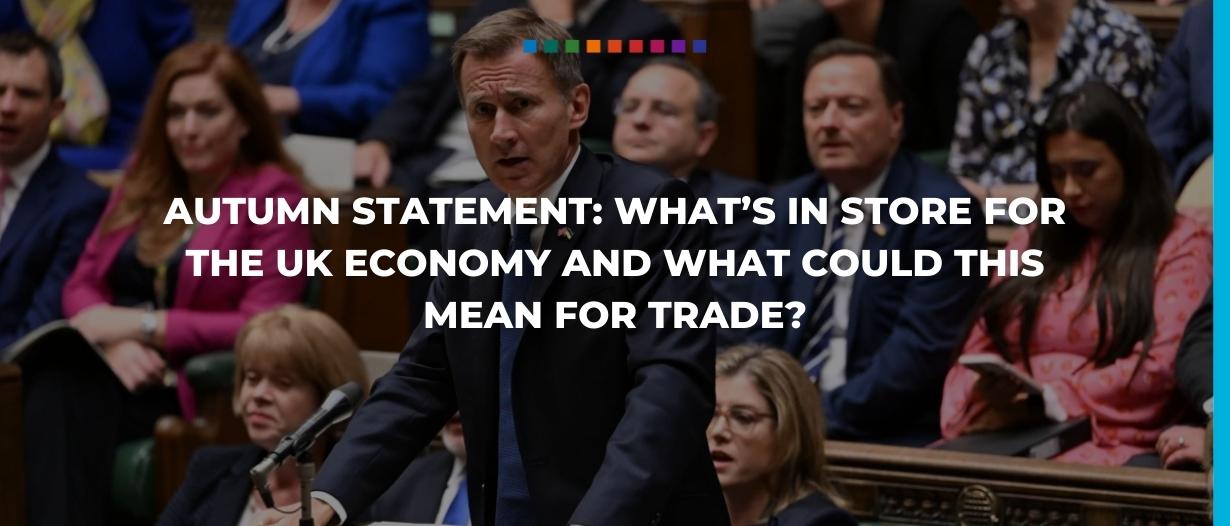Estimated reading time: 4 minutes
Economic volatility has sent tidal waves of strife around the world.
Worryingly, the current period of financial challenges, exacerbated by COVID-19 and the Ukraine-Russia conflict––consequently triggering energy and food crises––does not seem to be quelling.
Central banks are raising interest rates in a scramble to manage inflation issues and government debt levels have peaked, with debt interest spending expected to reach £120.4 billion this year.
Given this fractured and volatile backdrop, the 2022 Autumn Statement comes at a time when a need for economic and fiscal stability is paramount.
The Chancellor of the Exchequer Jeremy Hunt, said, “There is a global energy crisis, a global inflation crisis and a global economic crisis. But today with this plan for stability, growth and public services, we will face into the storm.”
But how will these new measures impact trade?
Goals of the statement
Hunt’s speech touched on a variety of issues, but there was a very particular thread that persisted throughout: the recession.
As of November 17, 2022, the UK is officially in a recession. This officiation follows a series of economic unfortunate events, not least the UK inflation level reaching 11.1% in October––the highest in 41 years.
The UK is not the only country feeling this heat, with the eurozone and most EU countries heading into an economic recession in the last quarter of 2022.
EU Economy Commissioner Paolo Gentiloni, said, “The economic situation has deteriorated markedly and we are heading into two-quarters of contraction.”
The International Monetary Fund (IMF) expects a third of the global economy to fall into recession this year or next.
This revelation has pushed the breaks on several fronts, with predictions of the UK economy shrinking by 1.4% in 2023, but most pointedly knocking UK small businesses for six.
Tax hit incoming for SMEs
One of the largest points of emphasis within the Chancellor’s speech was taxes.
The Chancellor announced £24 billion in tax rises and £30 billion in public spending cuts during his speech in the House of Commons.
Simon Montgomery, COO at ID-Pal said, “Today’s tax reforms will no doubt impact small businesses, who will see their tax bills rise on top of existing pressure from inflation and rising energy costs.
“While global tech companies dominate the headlines with their cost-cutting measures, it’s the smaller businesses that will feel the impact from these increases the most.”
Martin McTague, national chair of the Federation of Small Businesses, said, “[The budget is] high on stealth-creation and low on wealth-creation, piling more pressure on the UK’s 5.5 million small businesses, their employees, and customers.”
Despite this the statement pledges to continue supporting business growth through several means; reducing the burden of business rates by providing £13.6 billion of support for businesses over the next five years was high on the extensive list.
The commitment is a steep one, especially in light of the existing strains placed on small- and medium-sized enterprises (SMEs) after the Brexit dust settled.
Office for Budget Responsibility (OBR) projections corroborate this, expecting both exports and imports will be around 15 per cent lower in the long run than if the UK had remained in the EU.
Tony Danker, director general of the CBI, said, “All of us need to accept now that with fiscal and monetary policy tightening, we need many more pro-growth policies for our economy if we’re to avoid a decade of no growth.”
Elsewhere, Windfall tax on major oil and gas producers raised to 35% from 25% and 45% Energy Profits Levy rate are to be imposed on electricity generators to raise £14 billion next year.
This will undoubtedly affect the bottom line for UK businesses within the energy sector in addition to the existing inflationary rates and global economic flux.
Energy prices
The rising global energy prices, brought on by the Russia-Ukraine conflict, have led to a deterioration of the UK’s terms of trade. Gas prices have risen to record levels, offsetting the inflation issues many countries face today.
The ONS said gas prices have leapt nearly 130 per cent higher over the past year, while electricity has risen by around 66 per cent.
Energy price increases have made the country unavoidably worse off, with the UK now expected to spend the equivalent of 8% of GDP on energy (£190 billion) compared to 2% (£40 billion) prior to the pandemic.
In a bid to create more of a buffer with the cost of gas, the government will push ahead with the new nuclear power plant at Sizewell C in Suffolk.
Contracts for the initial £700 million investment in the plant would be signed within weeks, ultimately creating 10,000 jobs and generating enough power for six million homes.
Hunt said, “There is only one way to stop ourselves being at the mercy of international gas prices: energy independence combined with energy efficiency.
“We need to go further, with a major acceleration of home-grown technologies like offshore wind, carbon capture and storage, and, above all, nuclear.”
The future of trade for the UK
With so much uncertainty it is difficult to foretell how these new implementations will play out over the course of the next year.
Inflation, in addition to the cost of living crisis, fuel price surges, and supply chain challenges, are all ‘top of mind’ for many UK firms. Unfortunately, it seems these topics shall remain so for the foreseeable future.



























